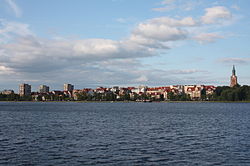Ełk, Poland
| Ełk | |||
|---|---|---|---|

View of Ełk across the Ełk Lake
|
|||
|
|||
| Coordinates: 53°49′17″N 22°21′44″E / 53.82139°N 22.36222°E | |||
| Country |
|
||
| Voivodeship | Warmian-Masurian | ||
| County | Ełk County | ||
| Gmina | Ełk (urban gmina) | ||
| Established | 1237 | ||
| Town rights | 1445 | ||
| Government | |||
| • Mayor | Tomasz Andrukiewicz | ||
| Area | |||
| • Total | 22.07 km2 (8.52 sq mi) | ||
| Population (2013) | |||
| • Total | 59,790 | ||
| • Density | 2,700/km2 (7,000/sq mi) | ||
| Time zone | CET (UTC+1) | ||
| • Summer (DST) | CEST (UTC+2) | ||
| Postal code | 19-300 | ||
| Area code(s) | +48 87 | ||
| Car plates | NEL | ||
| Website | http://www.elk.pl | ||
Ełk [ɛu̯k] (German: ![]() Lyck ; before 1939 rendered in Polish as Łęg or Łęk) is a town in northeastern Poland with 61,156 inhabitants (as of 2010[update]). It was assigned to Warmian-Masurian Voivodeship in 1999, after belonging to Suwałki Voivodeship from 1975 to 1998. Ełk is the capital of Ełk County. It lies on a shore of Ełk Lake, which was formed by a glacier, and is surrounded by forests. It is the largest city, and according to many, the capital of the region of Masuria. One of its principal attractions is hunting, which is carried out in extensive forests.
Lyck ; before 1939 rendered in Polish as Łęg or Łęk) is a town in northeastern Poland with 61,156 inhabitants (as of 2010[update]). It was assigned to Warmian-Masurian Voivodeship in 1999, after belonging to Suwałki Voivodeship from 1975 to 1998. Ełk is the capital of Ełk County. It lies on a shore of Ełk Lake, which was formed by a glacier, and is surrounded by forests. It is the largest city, and according to many, the capital of the region of Masuria. One of its principal attractions is hunting, which is carried out in extensive forests.
By 1283, the last Sudovian Prussian leader, Skomand (Lithuanian: Skalmantas), capitulated to the Teutonic Knights in the area. After 1323, the northern part of the region was administered by the Komturship of Brandenburg, while the larger part with the later town belonged to Komturship Balga. A former Old Prussian settlement, the town was first documented in 1398 around a castle built by the Teutonic Knights. The town's name has various postulated origins. Its German version Lyck is postulated to be derived from its Old Prussian name, Luks (from the word for waterlily, luka), while another theory holds that the name comes from Polish word "łęg" meaning meadow. It received its town rights in 1445.
...
Wikipedia



